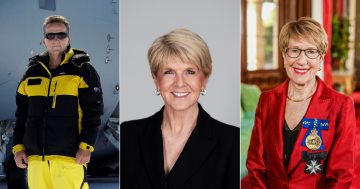 1. This week 10 years ago, Ministers for Police and Emergency Management from around Australia agreed to new, standardised phone numbers for emergency assistance.
1. This week 10 years ago, Ministers for Police and Emergency Management from around Australia agreed to new, standardised phone numbers for emergency assistance.
The new agreement established 132 500 as the national number to call for emergency help and 131 444 for non-emergency Police Assistance.
Attorney-General, Robert McClelland said the decision would improve the way the emergency call service operated in all States and Territories.
“Having one nationwide number to call when you need assistance in non–life-threatening or non–time-critical situations will make it easier for people to remember and use wherever they are in Australia,” Mr McClelland said.
He said Ministers had also agreed to improvements in the national Triple Zero service.
2. Assistant Treasurer, Bill Shorten and Attorney-General, Robert McClelland announced a new “common sense” definition of flood for homeowners seeking to take out home and contents insurance following a review of the natural disaster insurance that covered the Queensland, NSW and Victorian floods earlier in the year.
Mr Shorten said a standard definition of “flood” would be introduced to ensure there wasn’t a repeat of what had happened after the previous summer’s floods, where people with insurance policies with one definition of “flood” received compensation while people living next-door, with a different policy and different definition, received nothing.
“Many families and individuals affected by the 2010 and 2011 floods were not even aware their insurance did not cover flood,” Mr Shorten said.
3. A Bureau of Resources and Energy Economics (BREE) report revealed energy producers in Australia had already begun moving towards renewable energy sources.
Minister for Resources and Energy, Martin Ferguson said BREE’s Major Electricity Generation Projects report showed the transformation of Australia’s energy mix was under way.
He said 36 per cent of committed new investment for electricity generation was for gas and 41 per cent for wind.
“While these figures are encouraging, we still haven’t seen the actual investment on the ground in terms of the construction and operation of new plants in recent years that is going to be needed to meet demand,” Mr Ferguson said.
4. Victoria’s Attorney-General, Robert Clark announced reforms to the law of double jeopardy.
Mr Clark said the new law would allow a court to rehear a trial in cases such as where there was fresh and compelling DNA evidence, where the person acquitted subsequently admitted committing the crime, or where it became clear that key witnesses had given false evidence.
“In most cases these laws perform a valuable role in protecting an innocent citizen against being the subject of multiple prosecutions,” Mr Clark said.
“However, there are occasions where a retrial ought to be allowed if it becomes clear through compelling evidence not available at the time of trial that a person acquitted of a serious crime is highly likely to be guilty.”
5. NSW Auditor-General, Peter Achterstraat released an audit report of response arrangements for domestic violence incidents showing different service and success rates, depending on where the victims lived.
The audit found services were “fragmented”, not standardised and largely ineffective in providing ongoing solutions.
“There are no standard ways for victims and perpetrators to access help that might prevent ongoing violence and address underlying issues,” Mr Achterstraat said.
He recommended government and nongovernmental organisations adopt a common framework to identify domestic and family violence, assess risk, prioritise need and refer people to services.
6. And this week a decade ago, NSW Attorney-General, Greg Smith announced the establishment of volunteer squads of graffiti removers across the State as part of a joint initiative between the NSW Government, Rotary Clubs and a paint company.
Mr Smith said the project was an opportunity for people who had felt powerless against the “scourge of graffiti” to unite and restore pride in their community.
He said the Turramurra Rotary squad had cleaned more than 3,000 square metres of graffiti in their area.
“This success story can be replicated in other parts of the State with an identified graffiti problem and the NSW Government is encouraging Local Councils and businesses to form similar partnerships with Rotary to combat graffiti,” Mr Smith said.











